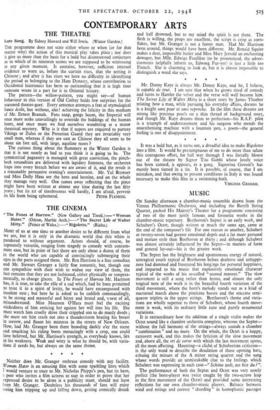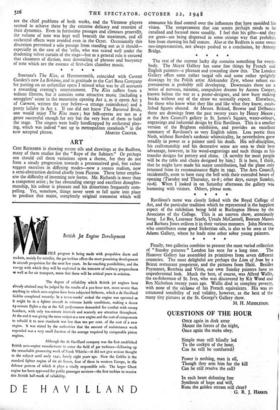MUSIC
ON Sunday afternoon a chamber-music ensemble drawn from the Vienna Philharmonic Orchestra, and including the Barylli String Quartet, packed His Majesty's Theatre for a programme consisting of two of the most justly famous and favourite works in the chamber-music repertory. Beethoven's Septet is an early work, and Schubert's Octet, though written at much the same age, came at the end of the composer's life For one reason or another, Schubert at twenty-seven had greater emotional depth and a far more personal and mature style than Beethoven at thirty ; and although Schubert was almost certainly influenced by the Septet—in matters of form and general lay-out—his is the greater work.
The Septet has the brightness and spontaneous energy of natural, untragical youth typical of Beethoven before deafness and unhappi- ness had dammed and frustrated his longings for personal happiness, and imparted to his music that explosively emotional character typical of the works of his so-called " second manner." The slow movement is still a song rather than hymn, and almost the only tragical note of the work is in the beautiful fourth variation of the third movement, where the horn's melody stands out as a kind of nocturnal march above the pizzicato basses and the staccato semi- quaver triplets in the upper strings. Beethoven's theme and varia- tions are wholly superior to those of Schubert, whose fourth move- ment is weak, with its ordinary little tune and purely ornamental variations.
It is extraordinary how the addition of a single violin makes the Octet sound like a chamber orchestra complete, whereas the Septet— without the full harmony of the strings—always sounds a chamber " combination " and no more. On the whole, the Octet is a happy, extrovert work, and this makes the lyricism of the slow movement and, above all, the cri de coeur with which the last movement opens, all the more affecting. Haunting—a cliché of Schubertian criticism— is the only word to describe the desolation of those opening bars, echoing the minuet of the A minor string quartet and the song whose words provide an unmistakable clue to the feelings which Schubert was expressing in each case—"Schone welt, wo bist du?".
The performance of both the Septet and Octet was very nearly perfect (the horn-player was twice caught by the two-octave leap in the first movement of the Octet) and provided some interesting reflections for our own chamber-music players. Balance between wind and strings and correct " chording " in homophonic passages are the chief problems of both works, and the Viennese players seemed to achieve these by the extreme delicacy and restraint of their dynamics. Even in fortissimo passages and climaxes generally, the volume of tone was kept well beneath the maximum, and all orchestral effects were avoided even in the Octet. Occasionally this discretion prevented a solo passage from standing out as it should— especially in the case of the 'cello, who was seated well under the deadening velvet curtain of the stage—but as a general rule it ensured that cleanness of diction, neat dovetailing of phrases and buoyancy of tone which are the essence of first-class chamber music.
Smetana's The Kiss, at Hammersmith, coincided with Covent Garden's new La Boheme, and in gratitude to the Carl Rosa Company for putting on an unfamiliar opera I missed what was by all accounts a rewarding evening's entertainment. The Kiss suffers from a tedious libretto, but it contains some attractive music (including a smugglers' scene in the mountains opening Act 2, as it opens Act 3 of Carmen, written the year before—a strange coincidence) and a pretty lullaby in Act 1. If one did not know The Bartered Bride, one would enjoy The Kiss more ; but folk-operas are not as a genre successful enough for any but the very best of them to hold the stage. The singers were badly handicapped by orchestral play- ing, which was indeed " not up to metropolitan standards " in the



































 Previous page
Previous page